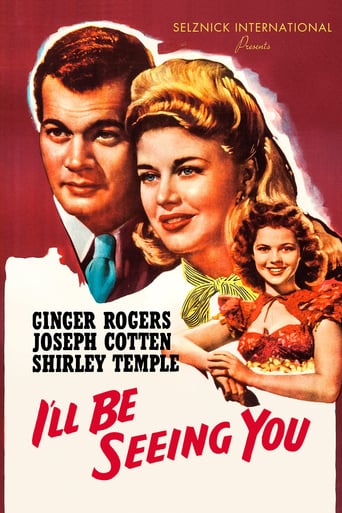weezeralfalfa
This story is too slow, simple, and predictable for me. Furthermore, the premise of the plot is unrealistic. I can't believe any prison would let any inmates out on a holiday vacation, traveling wherever they wish! Either they are on parole or house arrest or they stay in prison until released. Similarly, I can't believe a mental hospital would allow a patient to go home or wherever during the holiday season unless they are considered an outpatient. As the story suggests, being out in a normal world may reduce mental symptoms if they find someone sympathetic to their problem. Shirley Temple is mainly decorative, exhibiting some of the characteristics of a teen at that time, but finally spilling the beans to Cotton that Ginger is a jailbird out on furlough..... Nearly a decade later, Joseph Cotton would again play a soldier suffering from lingering combat fatigue, in "Niagara", costarring Marilyn Monroe.The title song is a classic, and we hear it during the opening credits, as well as at a dance. It was published in 1938, included that year in the Broadway play "Right This Way". Along with the film, several artists recorded it in 1944.
jarrodmcdonald-1
David Selznick produces an unusual picture starring Ginger Rogers, Joseph Cotten and a teenage Shirley Temple. This one is about the casualties of war on the home front. It is all very subtle and understated, and it could have seemed much more contrived in lesser hands.What's key here, for 1944, is that the filmmakers are not afraid to present a dark subject about a soldier experiencing traumatic stress disorder. This fact is even more significant considering the story has been produced during the war, with patriotism at its most fervent. There are some beautiful holiday scenes in this movie and the two lead characters are given a truly romantic storyline. Ultimately, it is an uplifting picture. I recommend seeing it.
bkoganbing
Written originally in 1937 the song I'll Be Seeing You struck a right chord in the wartime American public and enjoyed a big revival during the World War II years. A whole lot of artists recorded it, Bing Crosby's Decca record was the biggest seller. It was inevitable that someone would use it as a title for a film and David O. Selznick was the one who brought it to the big screen.Watching the film I'll Be Seeing You I was struck by the fact that this film showed the essential difference between the two warring global factions. There's no way that two protagonists in Nazi Germany or Bushido Japan would be in a film like this, one of them being a shell shock surviving soldier the other one being a woman convicted of a homicide and on a furlough from prison. You could never show in Nazi Germany anyone who was less than a fierce Teutonic warrior. Democracies take account for human frailties, may it ever be so.Joseph Cotten is our shell shocked soldier who's seen combat and it's shattered his nerves. His hospital doctors think a little time among some real ordinary American civilians might do him so good so he's furloughed from the hospital to visit his sister, but he finds she's moved away. So instead he decides to spend time with the family of a girl he met on the train.That girl is Ginger Rogers who was convicted of a homicide, but a flashback sequence where she explains what happened to her cousin Shirley Temple shows Ginger might not be the hardened criminal one might imagine. In fact with a better she might have beat the rap. Still for good behavior she gets to spend the Christmas/New Year's holidays with aunt Spring Byington and uncle Tom Tully her closest relatives. So these flawed and wounded souls meet and fall in love and the story runs pretty much along the lines that most wartime romances do, especially in World War II years. Both Cotten and Rogers do some really fine work in their well rounded portrayals of these people. And David O. Selznick rounded up a good cast to support them. Besides those already mentioned, take note of Chill Wills as the owner of a diner who was in the first World War and talks about his battle with shell shock which unnerves Cotten as he hasn't told Rogers yet. In fact the whole point of the film is both protagonists trying to summon up enough nerve to tell the other.Of course the title song is heard at critical times in the film, but never too obtrusive. I'll Be Seeing You is a fine example of the wartime romance World War II movie.
edwagreen
Ginger Rogers gives a restrained performance as a quiet victimized young lady who is sent to prison after accidentally pushing her drunken boss out the window.While on furlough, she meets Joseph Cotten, who is battle scarred. The two strike up a memorable friendship, and Rogers tries to keep it from him where she is going back to.Tom Tully and Spring Byington are just wonderful as the aunt and uncle she goes to during her leave. She brings Cotten to their home and they accept him with dignity and kindness. They are a wholesome couple promoting wonderful family values. Shirley Temple is their teenager daughter, outspoken, but kind in this 1944 film.Of course, the picture proves that you can't hide things; they have a way of coming out. Nevertheless, the performances by Cotten and Ms. Rogers are warm and memorable.



